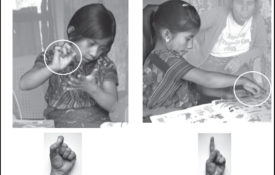-

Special Episode I: APS 2023 Spence Awardees on Fresh Starts, Time Perception, and the Well-being of Black Families
Riana Elyse Anderson, Ed O’Brien, and Hengchen Dai discuss how to study and improve the well-being and functioning of Black families, the importance of time in how people perceive progress, and how fresh starts can feel motivating.
-

Diversity Training: One Size Does Not Fit All
Diversity trainings as currently practiced are unlikely to change police behavior, suggests an analysis of a day-long training session designed to increase U.S. police officers’ knowledge of bias and use of evidence-based strategies to mitigate bias.
-

New Content From Perspectives on Psychological Science
A sample of articles on climate change and substance-use behaviors, using reality checks to assess heterogeneity, using an ethics and social-justice approach to collecting and using demographic data, and much more.
-

The Self-Taught Vocabulary of Homesigning Deaf Children Supports Universal Constraints on Language
Researchers compared how young homesigners—deaf children without access to an established sign language—and English-, Spanish-, and Chinese-speaking adults describe the use of tools such as paintbrushes and knives.
-
The Puzzling Gap Between How Old You Are and How Old You Think You Are
This past thanksgiving, I asked my mother how old she was in her head. She didn’t pause, didn’t look up, didn’t even ask me to repeat the question, which would have been natural, given that it was both syntactically awkward and a little odd. We were in my brother’s dining room, setting the table. My mother folded another napkin. “Forty-five,” she said. She is 76. Why do so many people have an immediate, intuitive grasp of this highly abstract concept—“subjective age,” it’s called—when randomly presented with it? It’s bizarre, if you think about it. Certainly most of us don’t believe ourselves to be shorter or taller than we actually are.
-
Why Music Causes Memories to Flood Back
When Laura Nye Falsone’s first child was born in 1996, the Wallflowers album “Bringing Down the Horse” was a big hit. “All I have to hear are the first notes from ‘One Headlight,’ and I am back to dancing … with my brand-new baby boy in my arms,” she says. “It fills my heart with joy every time” When Carol Howard’s early-onset Alzheimer’s worsened, often she couldn’t recognize her husband. She once introduced him as her father. But if she heard a 1960s Simon & Garfunkel song playing, Howard, a marine biologist who died in 2019, could sing every word “effortlessly,” her husband says. This ability of music to conjure up vivid memories is a phenomenon well known to brain researchers.

